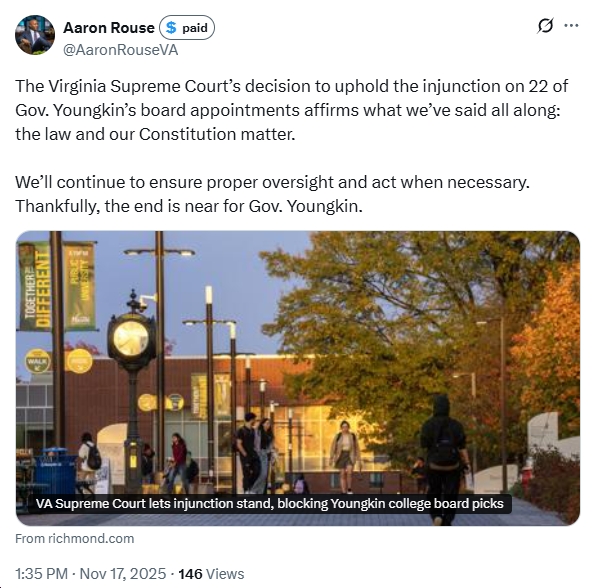by Mary Vause, Virginia public school teacher and education activist
Virginia’s “blue wave” elections of 2017 and 2019 have delivered a Democratic “trifecta” (Governorship, House of Delegates, State Senate) to our state government for the first time in decades. These “blue waves” were, in significant part, by public education supporters like Virginia teachers, support staff, parents, and community members who knocked doors, made phone calls, and encouraged friends and family to vote for pro-schools Democratic candidates. So now, with a solidly “blue” state government, Virginia’s public school students, teachers, and staff can FINALLY get the funding we have desperately needed for so long…right?
Unfortunately, it doesn’t appear that way in Governor Ralph Northam’s proposed budget, which in my view doesn’t go nearly far enough to address more than a decade of severe underfunding of Virginia’s public schools since the Great Recession. Specifically, I’d argue that Northam’s budget deserves an “F” for not doing enough in the areas of teacher pay, school infrastructure funding, and support staff funding.
On the salary front, Northam’s budget proposes NO salary increase for Virginia’s underpaid educators in year 1 of his budget, and a paltry increase in year 2, that won’t even keep up with inflation. Northam also fails to increase funding for Virginia’s aging school buildings that are in “borderline criminal” condition. And he leaves in place an arbitrary cap on school support staff funding instituted by conservative state legislators a decade ago that has cost Virginia’s public schools over $400 million every year since.
Northam calls his proposed budget that shortchanges K-12 public education “the most progressive in Virginia history.” Yet a closer look reveals that his plan doesn’t do nearly enough to make up for years of public school underfunding under a conservative General Assembly. As Virginia Educators United notes, “The roughly $800 million proposed for re-benchmarking in [Northam’s] budget only keeps pace with inflation and increased enrollment. The Governor is not proposing a $1.2 billion increase; he is proposing a $400 million restoration in funds (less than 4% of total K-12 funding) weighed against over $10 billion in accumulated cuts from the recession, from an education system that was already underfunded when the recession started.” Virginia Educators United (VEU) is a grassroots campaign of teachers, staff, parents, and community members who are advocating for better school funding. VEU also points out that the Governor’s proposed budget “does not include full funding for the Standards of Quality set by the Virginia Board of Education. These standards are established to articulate the bare minimums needed to consider our schools adequate. We cannot applaud any budget that does not fund these standards.”
Virginia’s Public Education Crisis
Virginia is the 12th wealthiest state in the country, but Virginia public school teachers make $8,483 less than the national average, ranking Virginia 32nd in teacher pay in the nation, according to the National Education Association. Comparing Virginia teachers’ earnings with their professional peers, the situation is even bleaker. A report by the Economic Policy Institute, a DC-based think tank, found that in recent years Virginia teachers’ pay “has fallen 31 percent lower than the wages of other college-educated workers” in the state. The report noted that Virginia teachers rank the third-worst in the nation in salary match-ups with similarly educated non-teaching professionals. In addition, a 2018 report by the Education Law Center at Rutgers University ranked Virginia 49th in teacher wage competitiveness out of 51 states and the District of Columbia.
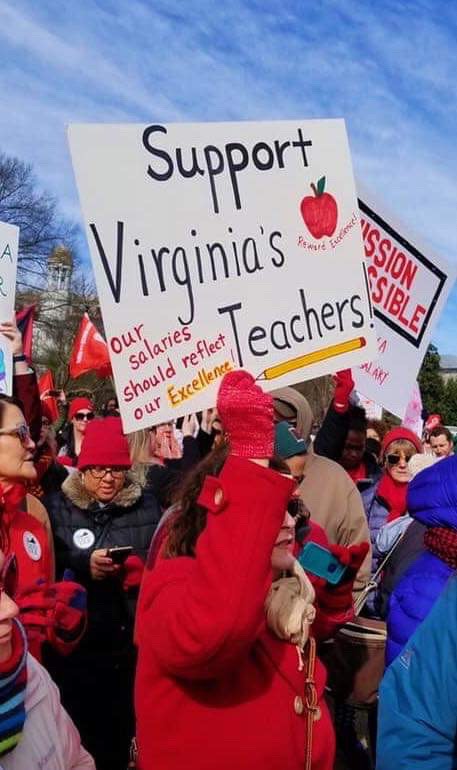
Under a Republican-controlled General Assembly, state legislators used the Recession as an excuse to cruelly withhold hundreds of millions of dollars in vital funding every year from Virginia’s public schools. In addition to the arbitrary cap on support staff that costs our schools $400 million per year, state per-pupil funding for K-12 education is down 9 percent, adjusted for inflation, since the 2008-2009 school year, and school staffing has declined by 1,242 positions, even though the student population in Virginia has grown by more than 53,000 students during that time, according to the Commonwealth Institute for Fiscal Analysis, which provides independent analysis of economic issues.
Sadly, Virginia teachers are all too familiar with having to teach more students with less funding, fewer support staff, and fewer resources. It’s a big part of why we’re leaving the profession in droves, a trend that is echoed nationally. A 2019 report by the Virginia Board of Education found that about 900 teacher positions in Virginia remain unfilled and that Virginia “is one of seventeen states with ‘regressive’ school funding, meaning less funding goes to high-poverty districts than wealthier divisions” According to a 2017 report from the Virginia Advisory Committee on Teacher Shortages, unfilled teaching positions in Virginia increased 40 percent from 2007 to 2017 and are a “crisis” in high-poverty school districts in particular. The Learning Policy Institute – a nonprofit, nonpartisan education research group, found that the turnover rate for Virginia’s K-12 teachers is greater than 44 states and the District of Columbia.
Yearly salary increases are essential to catching Virginia teachers up to the national average and to solving the state’s teacher shortage crisis. Yet Gov. Northam’s budget is recommending NO RAISE at all for Virginia’s underpaid teachers in year 1 of his budget and just a 3% raise in year 2. Keep in mind that the rate of inflation is about 2% per year, so as Virginia Educators United notes, a meager 3% raise over two years is “a de facto pay cut that pushes educators further below the national average.”
Sadly, many Virginia localities can’t be counted on to pick up the slack when the state fails to fund teacher and staff raises. Here in Newport News, since 2013 the City’s contribution to the local school system has not kept up with inflation, yet City Council gave level funding to the school system’s operating budget this past spring, even after teachers, staff, parents, and supporters attended Council meetings in #Red4Ed to advocate for better school funding for the third year in a row. Unfortunately, these struggles for local public school funding occur across Virginia, underscoring the importance of yearly support from the state for salary increases, and the need to help school districts in localities that can’t – or won’t – match funds in order to qualify for increased state education funding.
Where Have Virginians’ Tax Dollars Been Going Instead of to Schools?
If Virginia is among the wealthiest states in the country, why haven’t our students, teachers, and staff been getting the funding we need? In 2019, Gov. Northam and Republican majorities in the legislature joined forces to bankroll $750 million in corporate welfare for Amazon over 15 years, including $22,000 toward each of 25,000 new Amazon jobs with salaries that average $150,000 a year. Imagine if those funds had been invested in K-12 public education instead, especially with the recent news that Amazon is moving forward with a new office in New York City DESPITE New York legislators wisely refusing to offer tax breaks and corporate subsidies to a multinational corporation that is plagued by reports of worker abuses.
Also in 2019, Northam – weakened by scandal and by subsequent calls to resign from nearly every major Democratic elected official in the state – kowtowed to Republican leaders in the General Assembly to refund $976 million to taxpayers – instead of investing that money in Virginia’s public schools, which have languished in desperate need of funding for over a decade.
Inadequate Funding for School Infrastructure
While Northam’s proposed budget does make needed investments in school counselors and resources for English language learners, it fails to invest new funding into repair and replacement of Virginia’s aging, dilapidated school buildings. Spending on school infrastructure decreased in Virginia after the Recession, dropping by 33% from 2008 to 2016. Meanwhile, many of Virginia’s aging school buildings are in terrible condition, with numerous reports across the state of rodent infestations, mold, faulty heating, leaky roofs, falling ceiling tiles, and broken stall doors in bathrooms. Northam wouldn’t work in these deplorable conditions – why does he expect Virginia students, teachers, and staff to?
How to Fund Better Teacher Raises and Other School Needs
In response to this disappointing budget, the Virginia Education Association, the largest teachers’ union in the state, is renewing its call for a 5% pay increase for educators in each year of the biennial budget, as well as for full funding of K-12 public schools, as called for by the Virginia Board of Education. Virginia Educators United is calling for a 10% raise in each year for SOQ teacher and staff positions in year 1 AND year 2 of the biennial budget, in addition to a range of other progressive education demands.
Chris Duncombe, a senior policy analyst at the Commonwealth Institute for Fiscal Analysis, calculated the funding necessary for the VEA’s salary increase demand of 5% + 5% for Standards of Quality (SOQ) teacher and staff positions over the two years of the budget at $485 million, and for a 10% + 10% increase for SOQ teachers and staff over the biennial budget at $970 million.
Duncombe also identified sources of revenue that could help fund these and other education investments:
- “Establish a progressive tax code ($270 million) – Virginia’s top state income tax rate starts at just $17,000. This means people struggling to make ends meet and pay their bills on time are paying the same top rate as millionaires. Adding new tax brackets for millionaires and households making over $500,000 would improve the fairness of our tax system and raise resources for our schools.
- Modernize the state’s corporate income tax system ($80 million) – Add a combined reporting law so that large, multi-state corporations cannot shift profits to other states and get a tax advantage over main street businesses.
- Reinstate Virginia’s own estate tax ($70 million) – A state tax on inherited wealth is a powerful tool to build shared prosperity.
- Close tax loopholes and end bad tax breaks ($35 million) – Eliminate Virginia’s yacht tax loophole, film tax credit, online hotel tax loophole, and apply sales tax to digital downloads.
- Eliminate school privatization subsidies ($12 million) – Eliminate Virginia’s scholarship tax credit program (also known as a neo-voucher) that uses public funds to incentivize private school donations.” (Source: email interview with Duncombe)
Teachers’ Role in Virginia’s Labor Movement
Unfortunately, Northam’s dismissiveness toward the plight of Virginia teachers and staff isn’t very surprising since he announced in November — while flanked by the CEO of his top corporate donor Dominion Energy and by outgoing Republican House Speaker Kirk Cox — that he does NOT support repeal of Virginia’s anti-labor “right-to-work” laws. These misleadingly named anti-worker laws are a big part of why Virginia is ranked last in the nation in workers’ rights and why our minimum wage is still an abysmal $7.25/hour.
Last year, more than 2,500 Virginia teachers, staff, students, and other public education supporters rallied on the steps of the Capitol in Richmond in support of the #Red4Ed movement for better school funding. On Jan. 27, Virginia teachers and staff will once again rally at the Capitol, this time to lobby a Democratic-controlled legislature whose members campaigned on better school funding.
Virginia teachers and staff are on the front lines of Virginia’s burgeoning labor movement. Delegate Lee Carter (D-Manassas) has sponsored House Bill 67, which would give teachers the right to strike, and House Bill 153, which would repeal Virginia’s harmful and regressive right-to-work laws. Collective bargaining and the right to strike are correlated with higher pay for teachers and would be game changers in achieving better funding for Virginia’s schools.
How to Help
Public hearings on the Governor’s proposed budget are taking place on Thursday, Jan. 2, at four locations across the state: Northern Virginia, Blacksburg, Hampton Roads, and Richmond (visit http://sfc.virginia.gov to view locations and times).
You can also submit feedback about the budget online at https://www.governor.virginia.gov/constituent-services/communicating-with-the-governors-office/.
Please also contact your state delegate and senator to ask them to demand a budget that includes better funding for teacher pay, school infrastructure, and support staff. Visit https://whosmy.virginiageneralassembly.gov/ to look up contact info for your state legislators.
Instead of this inadequate budget, Democratic elected officials should take a stand for the long-underfunded public school students, teachers, and staff in their districts. Virginia’s public school children – and the teachers and staff who serve them – have waited long enough. Now is the time for state legislators to #FundOurFuture.
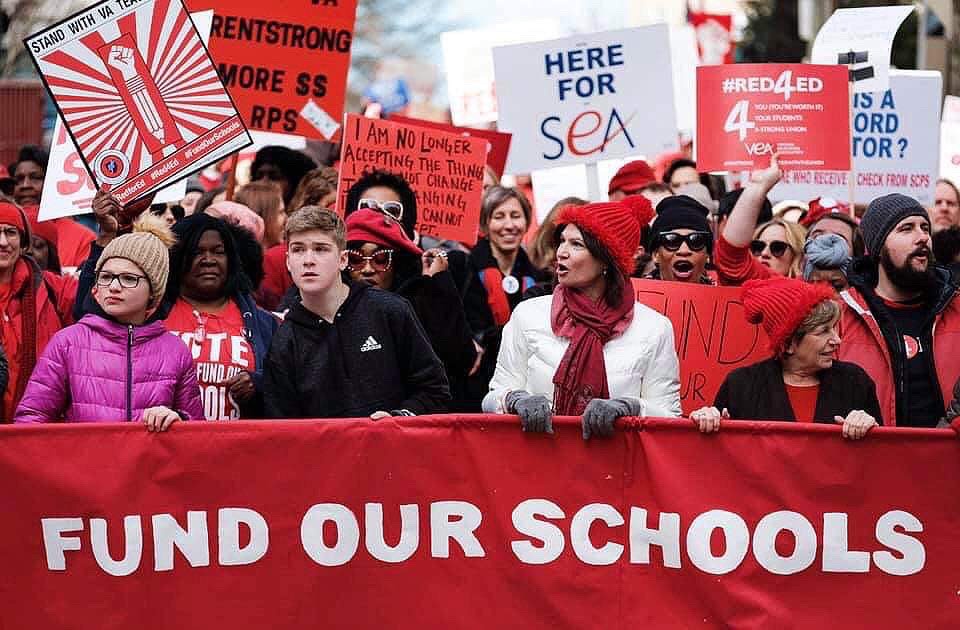

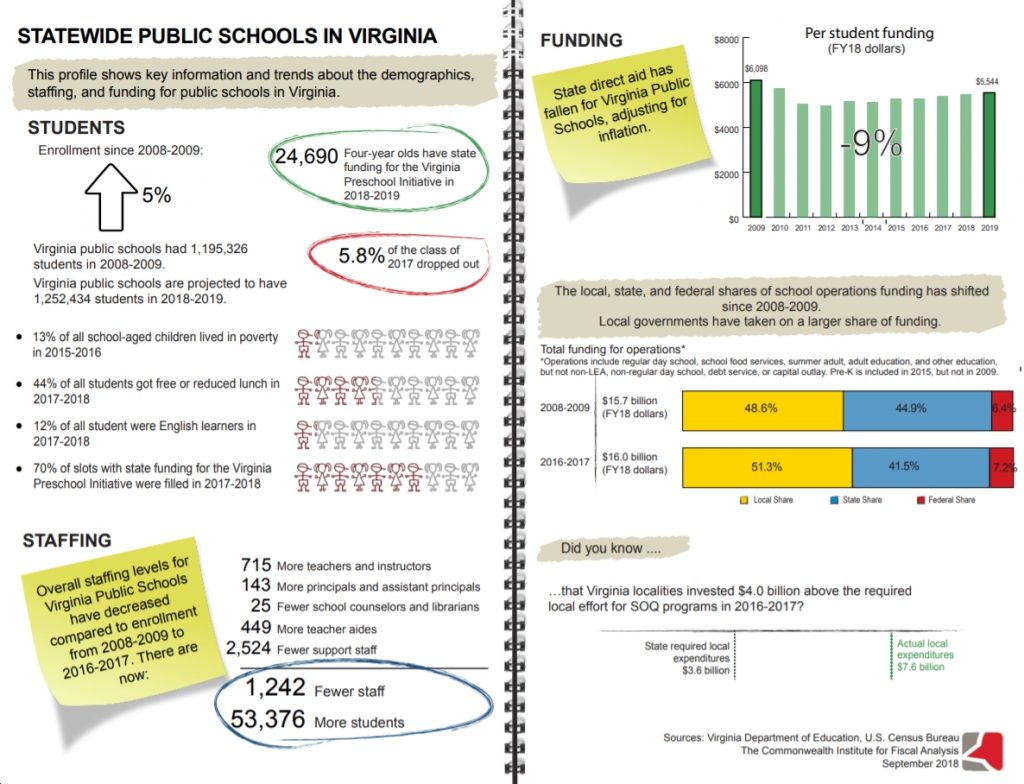
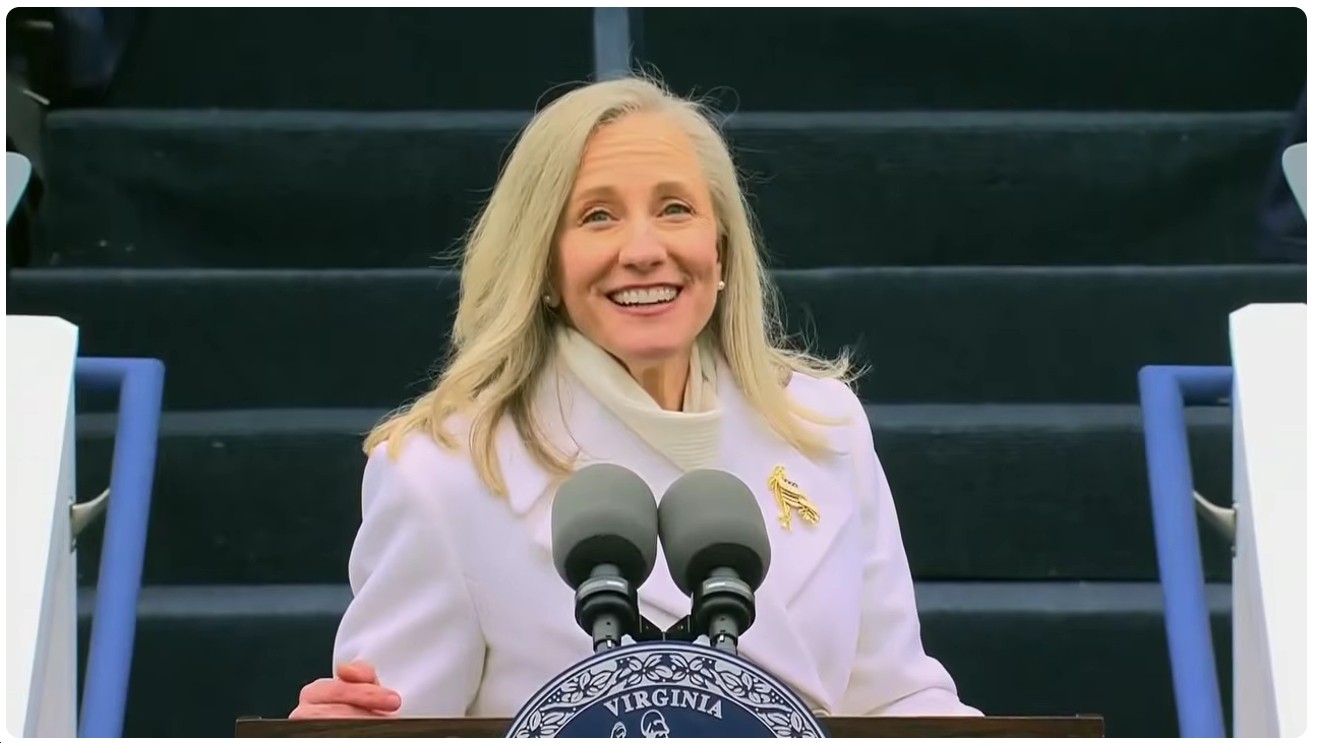
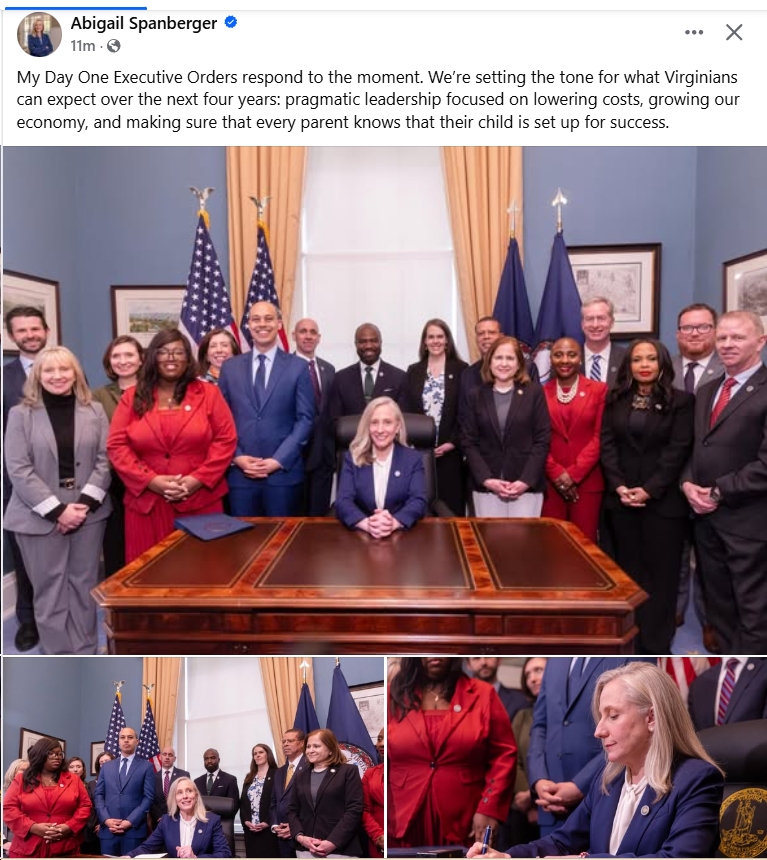
![“We the People for Education” Launches, with Goal of “push[ing] back against organizing from those seeking to divide parents and undermine public schools”](https://bluevirginia.us/wp-content/uploads/2023/03/wethepeopleeducation.jpg)
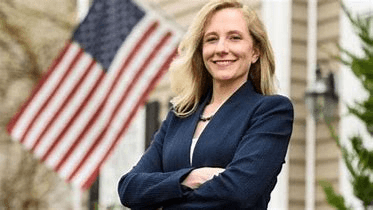
![Virginia NAACP: “This latest witch hunt [by the Trump administration] against [GMU] President Washington is a blatant attempt to intimidate those who champion diversity.”](https://bluevirginia.us/wp-content/uploads/2025/07/gmuwwashington.jpg)
